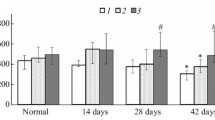Abstract
It has been suggested that dilatation of the ureter seen in pregnancy is caused by progesterone. Twenty-four patients with ureteral calculi, therefore, were given an intramuscular injection of 250 mg hydroxyprogesterone in order to facilitate the discharge of the stones. Irrespective of the duration of symptoms there was a potential effect of treatment in up to 66% of the patients. In patients with symptoms of less than three weeks duration the stones were discharged within three weeks after the first symptom in 75% of the cases, which is a much higher incidence rate than that stated in the literature for spontaneous stone discharge (18–30%). In patients with longstanding symptoms 50% of the stones had passed, as compared to 39% reported in the literature. Especially concrements with a diameter larger than 4 mm had a better discharge rate.
As the treatment is simple, cheap and without side effects, it seems worthwhile trying it in order to avoid surgery.
Similar content being viewed by others
References
Carstensen, H. E., Hansen, T. S.: Stones in the ureter.Acta Chir. Scand. Suppl.433, 66 (1973).
Fox, M., Pyrah, L., Raper, F. P.: Management of ureteric stones: a review of 292 cases.Br. J. Urol., 37, 660 (1965).
Guyer, P. B., Delany, D.: Urinary tract dilatation and oral contraceptives.Br. Med. J., 4, 588 (1970).
Harrow, B. R., Sloane, J. A., Salhanick, L.: Etiology of the hydronephrosis of pregnancy.Surg. Gynecol. Obstet., 119, 1042 (1964).
Hundley, J. M., Diehl, W. K., Diggs, E. S.: Hormonal influences upon the ureter.Am. J. Obstet. Gynecol., 44, 858 (1942).
Marshall, S., Lyon, R. P., Minkler, D.: Ureteral dilatation following use of oral contraceptives.JAMA, 198, 206 (1966).
Perlow, D. L.: The use of progesterone for ureteral stones: a preliminary report.J. Urol., 124, 715 (1980).
Ras, S., Ziegler, M., Caine, M.: Hormonal influence on the adrenergic receptors of the ureter.Br. J. Urol., 44, 405 (1972).
Roberts, J. A.: Hydronephrosis of the pregnancy.Urol., 8, 1 (1976).
Sala, N. L., Rubi, R. A.: Ureteral function in pregnant women.Am. J. Obstet. Gynecol., 99, 228 (1967).
Sandegård, E.: Prognosis of stone in the ureter.Acta Chir. Scand. Suppl.,219 (1956).
Traut, H. F., McLane, C. M.: Physiological chances in the ureter associated with pregnancy.Surg. Gynecol. Obstet., 62, 65 (1936).
Van Wagenen, G., Jenkins, R. H.: An experimental examination of the factors causing ureteral dilatation of pregnancy.J. Urol., 42, 1010 (1939).
Author information
Authors and Affiliations
Rights and permissions
About this article
Cite this article
Mikkelsen, A.L., Meyhoff, H.H., Lindahl, F. et al. The effect of hydroxyprogesterone on ureteral stones. International Urology and Nephrology 20, 257–260 (1988). https://doi.org/10.1007/BF02549512
Received:
Issue Date:
DOI: https://doi.org/10.1007/BF02549512




